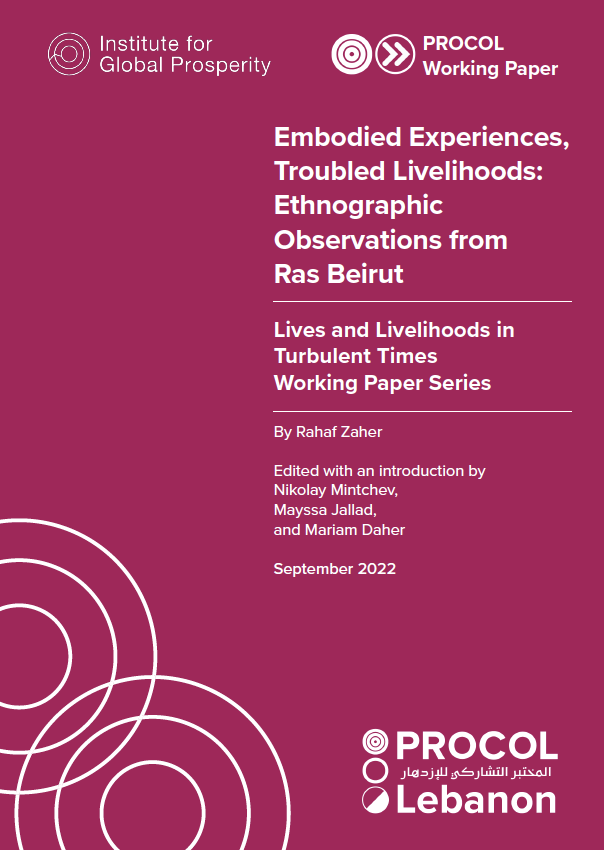Embodied Experiences, Troubled Livelihoods: Ethnographic Observations from Ras Beirut.
IGP Working Paper Series- Lives and Livelihoods in Turbulent Times

5 October 2022
By Rahaf Zaher.
Edited with introduction by Nikolay Mintchev, Mayssa Jallad and Mariam Daher
Lives and Livelihoods in Turbulent Times is a working paper series aiming to understand the changing nature of livelihoods in Lebanon today. The papers in this series formulate an account of how the multi-faceted crisis that Lebanon is currently going through is experienced by people and communities. The aim of the analyses is to develop a close understanding of what happens to people’s livelihoods, as well as their lives more broadly, in such difficult economic circumstances.
This is the first Working Paper in the series forming part of IGPs Prosperirty Co-Laboratory (PROCOL) Lebanon work.
The papers in this series aim to formulate an account of how this multi-faceted crisis is experienced by people in Lebanon. The aim of the case studies and analyses is to develop a close understanding of what happens to people’s livelihoods, as well as their lives more broadly, in such dire economic circumstances.
For example, in the ethnographic work by Zaher, Alawieh and Abi Faraj, the conversations and observations that the authors write about began as conversations about livelihoods, but often ended up revealing personal struggles and aspirations, as well as deeply felt anxieties, grief and anger.
In the first of the series Zahar writes:
As a citizen scientist conducting surveys, I was fascinated by the people I met – their acceptance of us, their personas, and their stories. Rarely a survey passed without bits and pieces of the survey respondent’s life being shared with us, citizen scientists. When the opportunity arose to conduct an ethnographic account of these surveys in addition to follow-up interviews with their respondents, I saw it as a way of advancing the research while continuing to engage with the people whose lives I was able to learn about. I remember their neighborhoods and the fragrances upon entering their vicinity, their homes and all the personal art and pictures they displayed, and their faces and how they changed with every narrative.
The main aim of our project was to study the changing livelihoods of workers and employers in Ras Beirut amid the consecutive tragedies continuously endured in the past two years. The ethnographies gave us a sense of the progression of this struggle. Between the initial survey and the follow-up interview, one can clearly detect how new challenges arose as the situation continued to worsen. Additionally, we got to know the interviewees at an intimate level as they talked openly about their present situation, reminisced about a more secure past, and hoped for stability in the future.
 Close
Close

